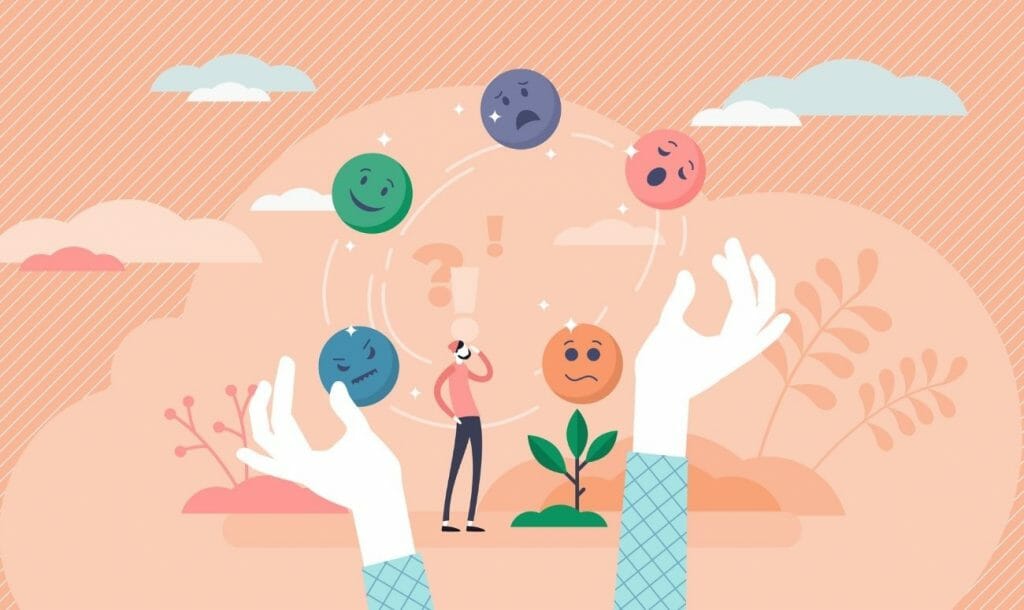Growing up, we’re taught to label emotions as “good” and “bad”. The feelings that make us feel wonderful, fulfilled, and happy are positive while the ones that bring conflict, discomfort, and loss are labeled as negative. However, most of the time these negative emotions are “not OK” because we fear how to address them, or we disregard them as invalid, a defense mechanism we often employ. We think emotions stall problem-solving and take too much time to process, so we suppress them regularly. We’re taught good girls don’t get angry and good boys don’t shed tears. “Maybe when you cried or showed a discomforting emotion, your caregivers told you to quiet down, relax and move past it. Or they told you to stop whining and be strong or even sent you on a time-out,” says G. Prakash, a licensed mental health counselor from Chennai, India. This reaction to your genuine action taught you to dismiss or ignore your feelings. It could possibly be a reflective response from your caregivers who never understood their own emotions and healthy ways to express them.
Many of us cope with these overwhelming emotions by throwing ourselves into work or a busy social life. This takes away time from practicing how to digest uncomfortable feelings. We begin to feel that we cannot be trusted to process negative feelings. That feeling these feelings is wrong and we inherently end up judging or criticizing ourselves for going through certain emotions. It’s easy to believe that you’ll fall apart instead.
But why do we need to understand our emotions instead of running from them?
“Our emotions have several underlying meanings,” explains G. Prakash. For instance, he says, anger shows us where we’re surrendering our power and where we need to speak up for ourselves. Fear motivates us to fight, flee or freeze in a situation that may possibly pose danger to us. Our emotions have several lessons they can teach us and the best way to go about it is to acknowledge, accept and learn from them. These underlying needs and wants that our emotions highlight need to be fulfilled to attain peace and happiness. The following prompts can help you acknowledge and name the emotions you’re feeling in an accessible manner.
- Write down the sensations coursing through your body. Draw an outline of yourself and mark where you’re feeling these emotions in your body
- Label these emotions that you’re feeling through different names or emoticons like smileys or stickers or even colours
- Next, write down all the thoughts you’re having while these emotions course through your body. Try and understand what this emotion is telling you
- Then, jot down the behaviours you’re engaging in. Are you shutting down? Are you reaching for your phone more frequently? Are you trying to distract yourself?
- Lastly, reflect on what triggered this state of being? What happened last before this emotion surfaced?
Our emotions have a lot to teach us, explicitly as well as inadvertently. But sometimes, we’re taught to process our emotions in a manner that needs to be unlearned for our own good as they discount our abilities and strengths. Negative emotions are uncomfortable and to avoid feeling such discomfort, we’re taught to suppress these ‘bad feelings’ by moving past or getting on with life. But visiting uncharted emotions that you haven’t explored before builds emotional and mental resilience. And while it’s natural for you to be afraid of the process, the learning process will help you become a better version of yourself. Below, we’ve listed 6 uneasy emotions that we’re conditioned to avoid but have a lot to teach us.
Anger
Anger isn’t just one emotion but a mask over other emotions like sadness, insecurity, fear, hurt or more. It alerts us of threats and the unmet needs we’re ignoring. It tells us if our freedom is being compromised; if our space is being invaded; if our pride has been hurt; or our emotions have been invalidated. Understanding that anger comes with other emotions in tow gives us the opportunity to handle situations as well as our emotions authentically. It takes accountability of the underlying emotion to process anger for what it’s hiding.

Frustration
Similar to anger, frustration is the top layer of a feeling. It signifies helplessness, an inability to achieve unfulfilled goals, desires, or needs. It could also be a sign that you’re being stifled or unheard or you’re internalizing feelings that need to be expressed. Emotional exploration can help you understand the possible emotions underlying frustration.
Sadness
We experience sadness when we go through a sense of loss in our lives. Whether it’s an insignificant loss like losing out on a much-awaited reservation at your favourite restaurant or something monument like losing a dream that you always held close. Letting ourselves feel this sadness means we honour what the loss meant for us. By letting it flow through you, you allow yourself to heal by experiencing all of the emotions that accompany sadness. This enables you to get to the bottom of it and makes you a stronger and more resilient person going forward.

Fear
Fear is an indicator of danger, it’s necessary to keep us safe, emotionally as well as physically. But sometimes it forces us to become too safe, for example, the hesitancy of starting your own business due to the fear of failure. Fear also shows up as nerves, the nervousness of a first date or a job interview. The important thing to realize here is that we experience fear also as a response to a perceived threat. It could or could not be real. Our brain is a wonderful yet confusing organ, we often invent or imagine something to fear.
Envy
Envy is the desire for something we don’t have, like someone’s beautiful looks or a lifestyle that someone sports. It’s a natural part of how we experience and interact with life. Though subtle, it gives us a sense of direction on what to focus on. The poisoning effect of this emotion is known by many but when seen in a positive light, envy can be an inspiring motivator to change our habits and priorities. It can make you question what you want from your life, why do you want it, and what you would do if you had it? And while it doesn’t need to be encouraged, it needs to be heard. Envy has a lot to say, it’s a voice that pushes us to connect with something we truly desire.
Loneliness
Something that we always fear is the feeling of being lonely. It forces us to be in our own company however uncomfortable that may be. Loneliness motivates us to find the answers that we’re looking for within us. It allows you, when embraced, to become the person you truly are meant to be when the distractions and noise of others fade away. It teaches us to have courage in ourselves, to find our own voice and to find ways to turn our life around.

Often, we aren’t so good at listening to our emotions. We might not have done it before or we might’ve internalized toxic messages from family, friends, or society like repressing uncomfortable emotions because they are undesirable. Practicing mindfulness techniques every day can help you become aware of your emotions without holding judgment, this helps us open the door to what they have to say and what our gut is really telling ourselves.
Read more: Giving Away Old Books? Turn Them Into Art With Resin Instead
Like & Follow ThinkRight.me on Facebook, Instagram, Twitter, and Telegram to stay connected.






























